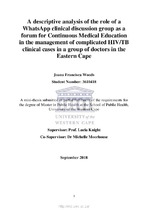A descriptive analysis of the role of a WhatsApp clinical discussion group as a forum for continuous medical education in the management of complicated HIV/TB clinical cases in a group of doctors in the Eastern Cape
Abstract
Background: As South Africa’s HIV programme increases in size, increasingly complex HIV/TB cases occur that are often beyond the clinical scope of primary health care clinicians. In the Eastern Cape (EC) province, health facilities are geographically widespread, with a discrepancy of specialist availability outside of academic/tertiary institutions. The use of WhatsApp, a Mobile Instant Messaging (MIM) application, could facilitate learning and mentoring of primary healthcare clinicians in peripheral facilities. The aim of this study is to describe this app and its use as an alternative learning tool to improve clinician access to specialized management of complicated HIV/TB cases, as part of Continuing Medical Education (CME).
Method: A an observational, descriptive cross-sectional study was conducted among a group of clinicians from the EC province that formed part of a Wits RHI WhatsApp HIV/TB clinical discussion group from January 2016 to July 2017. Data was collected using a structured anonymous internet questionnaire, distributed to the clinicians that formed part of the WhatsApp group, informed consent being obtained from participants prior to completion. Data was analysed with Epi Info, using descriptive and analytic statistics. Frequency distributions and cross tabulations were generated and bi-variate analysis was done to determine significant associations between relevant variables.

